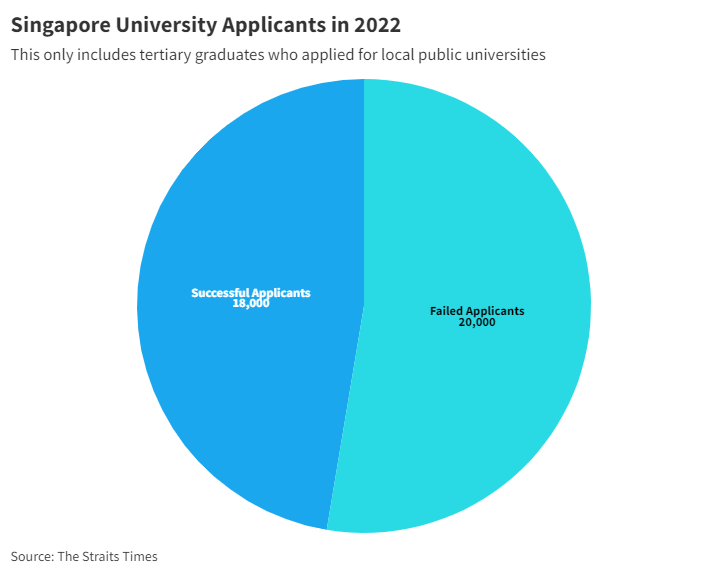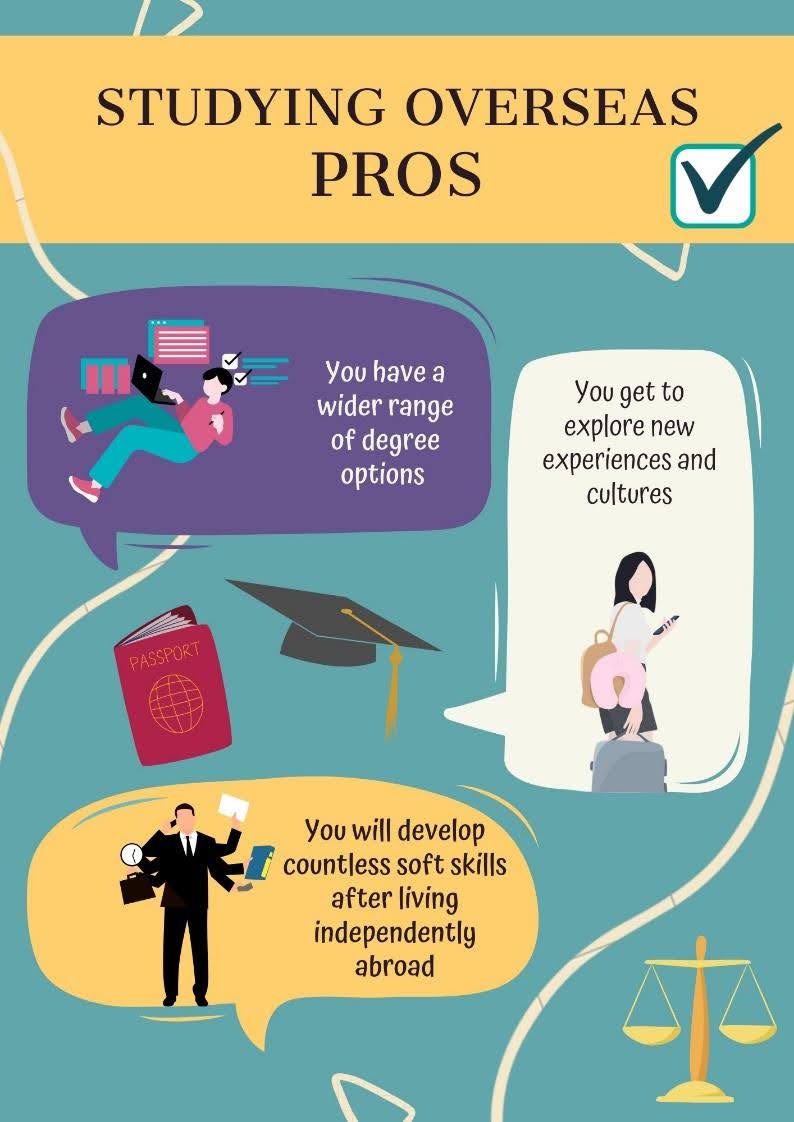Higher Education: Is Going to University a Want or a Need?
NEO WEI TING explores the debate on whether a university degree is necessary in this day and age.
BY
Neo Wei Ting
Events Manager
Hype Issue #59
Published on
June 14, 2024
As I approach my final months in Polytechnic, the question of “what’s next?” is constantly on my mind. The most appealing option is, of course, the most common: furthering my studies at university. However, as I inch closer to graduation, I start to wonder if I should spend another three to four years of my life watching lectures and completing assignments to get a degree. If you’re just like me; unsure about how to reply when someone asks about your path post-graduation, read on. In this article, I’ll be covering the various considerations surrounding the pursuit of a university degree.
During an Education Forum held in Mar 2023, Minister of Education Mr.Chan Chun Sing urged Singaporeans to look beyond their grades and start focusing on skills development instead. He has also been a strong advocate for employers prioritising skills and competencies over academic qualifications when hiring.
Despite this, many graduating students still believe obtaining a degree is a requirement, even though acquiring skill sets through work experience is equally important. According to The Straits Times, 38,000 tertiary graduates applied for places in local universities in 2022, and only 18,000 students were successfully placed. The remaining 52.6 per cent were left to either take a gap year, try again in the following years, or start work immediately.

Over half of the tertiary graduates who applied for university places were rejected in 2022. Chart made with Flourish.
This brings us back to the traditional mindset of needing a degree. Growing up, most of us have had our parents constantly drilling into us the importance of studying hard and getting a degree in order to secure a good job, forcing us kids to fall victim to thinking university is our end goal. As the number of university applicants increases, Singapore leans more and more towards “credential inflation”. This term is used to describe a hiring practice where higher-paying jobs are offered simply due to paper qualifications rather than greater skills or productivity.
How Job Requirements are Evolving
What most people forget is the fact that not all job scopes require a university degree. If you’re looking into careers such as law, medicine and architecture, you would need a professional degree in the specific field of study regardless. However, other industries may not look at your cold-hard qualifications as much. A LinkedIn report in 2021 showed that more companies prefer to hire candidates with technical and transferable skills over those with purely educational qualifications in Singapore.
Edwin Leong, 21, is a polytechnic graduate who is currently serving National Service at the Officer Cadet School (OCS). At polytechnic Mr. Leong pursued his passion of becoming a preschool teacher and graduated with a diploma in Early Childhood and Development.When asked why he has no intentions of pursuing a degree, he responded that a polytechnic diploma is sufficient. “I believe my skills as an Early Years educator are highly proficient. I’m also able to adapt to current trends and generations, so I feel that my teaching style is highly suitable for this industry,” Mr Leong said.

Though there are Early Childhood Education degrees, a diploma in this field is enough to enter this line of work. Photo from Unsplash.
University Remains as a Valuable Asset
Universities will not become obsolete. There are still certain benefits that only a degree can get you. University graduates will generally have a higher starting pay compared to those without a university education. A degree can also provide certain credentials that will set you apart from the rest in the same industry. There is no denying that a higher education will make you a more attractive candidate compared with an individual who doesn’t have the qualifications. This will help boost your career opportunities for better job prospects and bring advantages such as job security in the long run.
Many of those who apply for university courses are Junior College graduates. Iris Tan, 19, graduated from Anglo-Chinese Junior College last year and recently enrolled in Business at NTU’s Nanyang Business School. Iris believes pursuing a degree will be a “useful step into the working world” and help “significantly enhance job prospects”. She also wishes to meet people and start networking through opportunities such as exchange programmes, which are “valuable for future career connections”.
On the topic of exchange programmes, a benefit not often talked about is the chance to study abroad for university students. Many students have chosen to advance their studies overseas for a new change in environment and culture. Studying overseas has a plethora of benefits on its own, from gaining soft skills to engaging in new experiences, and even getting specific qualifications that cannot be obtained in Singapore.

Exploring the many benefits of studying abroad may tempt you to apply for university. Infographic by Neo Wei Ting
Despite the strong plus points a degree brings, Iris acknowledges that there are alternative pathways that could be advantageous to her as well. “I am particularly interested in the marketing field in Business school. However, I believe that a university degree isn’t the only option to enter this industry. There are many other options out there such as a Polytechnic diploma specialising in the marketing field which could potentially allow one to earn a place in this industry,” Iris said.
Changing Perspectives
Currently, soft skills such as communication, critical thinking, problem-solving, and adaptability are highly valued by employers. Singaporeans need to focus more on gaining relevant skills rather than just aimlessly pursuing a degree. Understanding the balance between academic recognition and personal skill sets for a desired job is the first step to deciding whether a degree is necessary. Do you have a job in mind when considering a university course? Start thinking and researching what this job requires and you may just have a lightbulb moment. Good luck!

obviously like your web-site but you need to test the spelling on quite a few of your posts. Several of them are rife with spelling problems and I to find it very troublesome to inform the reality on the other hand I’ll certainly come back again.
Hi i think that i saw you visited my web site thus i came to Return the favore I am attempting to find things to improve my web siteI suppose its ok to use some of your ideas
Thanks I have recently been looking for info about this subject for a while and yours is the greatest I have discovered so far However what in regards to the bottom line Are you certain in regards to the supply
Your blog is a treasure trove of knowledge! I’m constantly amazed by the depth of your insights and the clarity of your writing. Keep up the phenomenal work!
My brother suggested I might like this website He was totally right This post actually made my day You cannt imagine just how much time I had spent for this information Thanks
I loved as much as youll receive carried out right here The sketch is tasteful your authored material stylish nonetheless you command get bought an nervousness over that you wish be delivering the following unwell unquestionably come more formerly again since exactly the same nearly a lot often inside case you shield this hike
I was just as enthralled by your work as you were. Your sketch is elegant, and your written content is sophisticated. However, you seem concerned about potentially delivering something questionable soon. I’m confident you’ll resolve this issue quickly and return to your usual high standards.
insurance quotesI think that you could do with some pics to drive the message home a little bit,
For those looking to monetize their content, FlashUpload.cloud offers advanced monetization options. This allows users to maximize their revenue while using a secure and reliable platform. By choosing a premium plan, you can turn your passion into profit and explore new financial opportunities.
먹튀검증으로 토토사이트와 온라인 카지노사이트 먹튀 피해를 예방하는 먹튀검증사이트
Nice blog here Also your site loads up fast What host are you using Can I get your affiliate link to your host I wish my web site loaded up as quickly as yours lol
hiI like your writing so much share we be in contact more approximately your article on AOL I need a specialist in this area to resolve my problem Maybe that is you Looking ahead to see you
Your insights are always thought-provoking.
I just could not depart your web site prior to suggesting that I really loved the usual info an individual supply in your visitors Is gonna be back regularly to check up on new posts
Hello i think that i saw you visited my weblog so i came to Return the favore Im trying to find things to improve my web siteI suppose its ok to use some of your ideas
hiI like your writing so much share we be in contact more approximately your article on AOL I need a specialist in this area to resolve my problem Maybe that is you Looking ahead to see you
Wow wonderful blog layout How long have you been blogging for you make blogging look easy The overall look of your site is great as well as the content
I have read some excellent stuff here Definitely value bookmarking for revisiting I wonder how much effort you put to make the sort of excellent informative website
I do agree with all the ideas you have introduced on your post They are very convincing and will definitely work Still the posts are very short for newbies May just you please prolong them a little from subsequent time Thank you for the post
My brother suggested I might like this website He was totally right This post actually made my day You cannt imagine just how much time I had spent for this information Thanks
Hello Neat post Theres an issue together with your site in internet explorer would check this IE still is the marketplace chief and a large element of other folks will leave out your magnificent writing due to this problem
Somebody essentially help to make significantly articles Id state This is the first time I frequented your web page and up to now I surprised with the research you made to make this actual post incredible Fantastic job
Simply wish to say your article is as amazing The clearness in your post is just nice and i could assume youre an expert on this subject Well with your permission let me to grab your feed to keep updated with forthcoming post Thanks a million and please carry on the gratifying work
Vitazen Keto Gummies naturally like your web site however you need to take a look at the spelling on several of your posts. A number of them are rife with spelling problems and I find it very bothersome to tell the truth on the other hand I will surely come again again.
I do not even know how I ended up here but I thought this post was great I dont know who you are but definitely youre going to a famous blogger if you arent already Cheers
Pod systems and disposable vapes have become increasingly popular for their convenience and discreetness, allowing users to vape on-the-go without hassle. This trend aligns with the evolving lifestyles of consumers seeking convenience without compromising on the vaping experience.
Ny weekly For the reason that the admin of this site is working, no uncertainty very quickly it will be renowned, due to its quality contents.
Real Estate Nice post. I learn something totally new and challenging on websites
Real Estate I truly appreciate your technique of writing a blog. I added it to my bookmark site list and will
Real Estate I do not even understand how I ended up here, but I assumed this publish used to be great
Higher education sparks debate—is university a personal desire or a professional necessity? Explore how degrees impact career prospects, personal growth, and whether the investment truly aligns with your goals. At the same time, prepare with valid tests FCSS_SASE_AD-24 to master Secure Access Service Edge (SASE) concepts. Access updated questions, expert-verified answers, and realistic practice exams to confidently pass your certification and advance your career in cybersecurity and network architecture.
Explore whether higher education is a want or a need by weighing career goals, job market demands, personal growth, and alternative pathways to success in today’s evolving academic and professional landscape. At the same time, advance your career with the PCNSE Certification, a globally recognized credential in network security. DumpsJournal offers reliable study materials to help you master Palo Alto technologies and confidently pass the PCNSE exam on your first attempt.
Visit: https://www.dumpsjournal.com/Exam/PCNSE-dumps.html